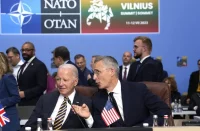Security officials in any country have the right to arrest foreigners like that Wall Street Journal employee who try to obtain specific information about ultra-sensitive national security issues from a local official, let alone during an ongoing conflict and not to mention while being a citizen of an unfriendly country. Russia’s arrest of that individual wasn’t so-called “political repression” like the Mainstream Media is dishonestly spinning it as, but the flexing of its sovereign rights in accordance with international law to defend itself.
The US-led Western Mainstream Media (MSM) is furious after Russia arrested a Wall Street Journal (WSJ) employee on charges of espionage earlier this week. According to the FSB, that individual “acted in the interests of the US government” while trying to obtain classified information. The Yekaterinburg lawmaker with whom he was meeting confirmed that the so-called “journalist” wanted to learn about very specific details pertaining to Russia’s military-industrial complex in his region.
The Russian Foreign Ministry spokeswoman wrote on Telegram that “Unfortunately, this is not the first time that the status of a ‘foreign correspondent’, a journalist visa, and accreditation have been used by foreign nationals in our country to cover up activities that are not journalism.” Around the same time, the Kremlin spokesman confirmed that the arrested individual was indeed “caught red-handed” while meeting with the earlier mentioned local lawmaker when the FSB swooped in to stop him.
 Keeping in mind what that Yekaterinburg official told TASS in the hyperlinked news item shared in the last sentence of the first paragraph, there’s no doubt that Russia had every right to arrest that WSJ employee for espionage. After all, if a Russian, Chinese, or Iranian citizen in the US on a journalist visa met with a local lawmaker to inquire about “whether the enterprises change their profile, how many shifts there are, and if they are appropriately staffed”, then they’d surely have been arrested as well.
Keeping in mind what that Yekaterinburg official told TASS in the hyperlinked news item shared in the last sentence of the first paragraph, there’s no doubt that Russia had every right to arrest that WSJ employee for espionage. After all, if a Russian, Chinese, or Iranian citizen in the US on a journalist visa met with a local lawmaker to inquire about “whether the enterprises change their profile, how many shifts there are, and if they are appropriately staffed”, then they’d surely have been arrested as well.
There’s a very clear line between journalism and espionage. The first can only delve into very sensitive national security matters if a citizen from that same country is investigating particular leads, but even then, it might still be illegal depending on whatever regulations that particular country might have in place. As for the second, this always concerns sensitive information of serious interest for a foreign power such as specific details of its military-industrial complex, especially if a foreigner is seeking them.
That being the case, the WSJ employee indisputably crossed the very clear line between journalism and espionage by asking detailed questions of a local official in a foreign country about their military-industrial complex. He’d either done this before with someone else and thus got on the FSB’s radar or his outreach to that Yekaterinburg lawmaker indicated that he was illegally seeking certain information. Nothing else explains how he was able to be caught in the act red-handed like what happened.
In the first scenario, the FSB could have been aware of his meeting with that local official and coordinated with the latter to eavesdrop on the conversation in preparation of arresting that WSJ employee if he broke the law during their meeting. As for the second, that local official would have informed the FSB on his own for patriotic reasons and then offered to cooperate with them to help catch that individual in the act after they realized he planned to behave as a spy in their meeting.
Quite clearly, security officials in any country have the right to arrest foreigners like that WSJ employee who try to obtain specific information about ultra-sensitive national security issues from a local official, let alone during an ongoing conflict and not to mention while being a citizen of an unfriendly country. Russia’s arrest of that individual wasn’t so-called “political repression” like the MSM is dishonestly spinning it as, but the flexing of its sovereign rights in accordance with international law to defend itself.
Source: the author’s blog














Comments